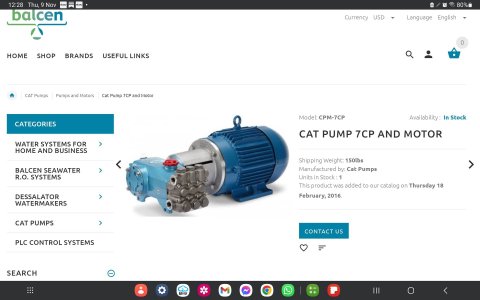geem
Well-Known Member
Or my watermaker. 1.5kw. water production 200litres/ hour.This again?
Schenker modular 30 (12V):
Power consumption: 96W
Current draw at 12V: 8A
Water production: 30L/h
Water production/Ah: 30/8 = 3.75L/Ah
Rainman (230V):
Power consumption = 2kW
Current draw at 12V (via inverter) = 2000/12 = 166A
Water production = 60L/h
Water production/Ah = 60/166 = 0.36L/Ah
The Schenker we've been using all the way from UK to NZ has let us down once with a cracked low-pressure hose. Across the Pacific it supplied enough water for 6 people to shower every day, and we never had to run the engine to generate power (we have a Watt and Sea towed generator). At anchor, we generate all our power with 700W of solar, and this has been sufficient, at all times except winter in Wellington. If we had to use 10x more energy for each litre of water, we would certainly have run the engine more often to keep up with power demands on board.
Your watermaker makes so little water, it has to run for 3.3 times the time of our 220v model for the same production. It might only use a small amount of power but when they go wrong, and they do go wrong, fixing it is expensive and they require specific parts.
We also have 720w of solar and run our watermaker, cook, make hot water all on the solar. You can choose low amps or reliability but not both. You chose low amps and high cost. We chose low cost and high amps. Either is not wrong. It's just a different way of doing things.
We both do it all of solar so no difference there
Edit:
I just noticed your watermaker is only 30 litres per hour so you need to run it for 6.6hrs to my 1 hour for the same production. A Zen 30 costs about €5000 for 30 litres/hr. I built my watermaker for way less than that. We already had a diesel generator thst came with the boat, so it was a logical choice.
Now we have lithium we no longer need the generator as long as we are in the Tropics. We harvest 3.5kwh of solar on average, here in the Caribbean with 720w of solar. We just added another couple of hundred watts so now we are harvesting 4.5kwh of solar per day. Making our daily water needs is only 460Wh so about 10% of our daily solar harvest. Its less than making our hot water needs per day and less than our daily electric cooking load on the induction hob.
Last edited:

